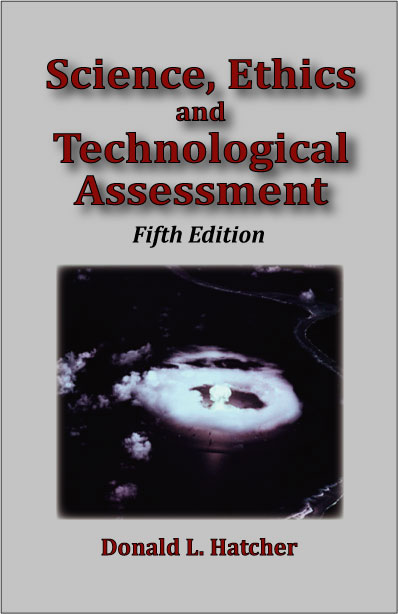Academic, Professional, Technical, Trade, Research Books & Journals
americanpress@flash.net • 617-247-0022 • 75 State Street #100 • Boston, MA 02109
Science, Ethics, and Technological Assessment
by DONALD L. HATCHER
5th edition, 308 pages, $29.95
ISBN 978-0-89641-504-1
The purpose of Science, Ethics and Technological Assessment is to help citizens understand the relation among science, ethics and technological assessment so that specific public policy issues can be evaluated more intelligently: that is, from both practical and ethical perspectives. The gravity of many of these decisions is so great that responsible citizens are left with no alternative but to become actively involved in the process.
There are many books on the methods of science. There are many more on ethics. There is also a growing number on the social problems created by technology and unenlihtened technological assessment. This book tries, in three short chapters, to integrate all three areas, giving readers an adequate understanding of both scientific methods and ethical frameworks necessary for an intelligent evaluation of alternative policies connected to technological change. Given its design, readers familiar with ethics and the logic of ethical decision making should learn a good deal about science and technological assessment, while th scientist or technologist should learn a good deal about ethics.
CONTENTS
Chapter 1: THE NATURE OF SCIENTIFIC THINKING
The Obligation to Understand the Methods of the Sciences
On the Methods of the Natural and Social Sciences
The Challenge of Radical Relativism
Some Further Criticisms of the Scientific Approach to Knowledge
The Priviledged Position of Science
What Happens when Scientists Disagree?
Some Problems with Science and Risk Assessment
Discussion QuestionsChapter 2: BRINGING ETHICAL CONSIDERATIONS TO POLICY DECISIONS
The Importance of Understanding Normative and Applied Ethics
Some Inadequate Approach to Normative Principles
A Quasi-Kantian Approach to Ethical Values
Three Additional Approaches to Ethical Issues (Utilitarianism, Existential Ethics, Rawlsian Contract Theory)
Applying Ethical Theories
Values in Conflict
Conclusion
Discussion QuestionsChapter 3: TECHNOLOGY: A BLESSING OR A CURES?
Introduction
What is Technology?
The Symbiotic Relationship Between Science and Technology
Living in a Technological World
The Debate Over Technology
The Argument for Technology
A Few Arguments Against Contemporary Technology
The Daunting Tasks of Technological Assessment and Control
Conclusion
Discussion QuestionsWORKS CITED
INDEX
ABOUT THE AUTHOR
Donald L. Hatcher is a professor of Philosophy and Religion at Baker University in Baldwin City, KS. He received his Ph.D. from the University of Kansas.